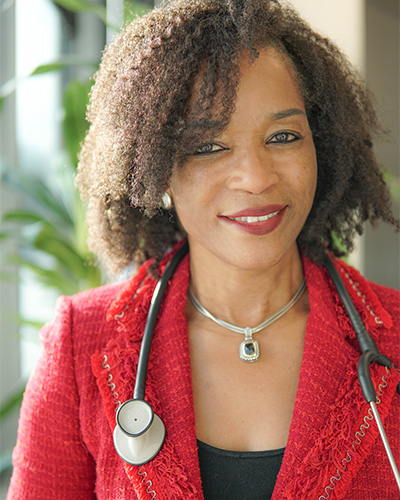Black Health Matters Winter 2024 Summit Rewind Heart to Heart: Breaking Down Barriers to Clinical Research
91ł£ņŻĶľļĹ‚Äôs Dr. Elizabeth Ofili spoke with Black Health Matters about a study to evaluate the association between lipoprotein(a) and cardiovascular risk in African Americans.
 Dr. Elizabeth Ofili, MD, MPH, FACC
Dr. Elizabeth Ofili, MD, MPH, FACC
Professor of Medicine and Principal Investigator of the RCMI Coordinating Center at
Morehouse School of Medicine
Sheila Thorne spoke with Elizabeth Ofili, MD, MPH, FACC, Professor of Medicine and Principal Investigator of the RCMI Coordinating Center at Morehouse School of Medicine, about how new initiatives are overcoming the hurdles of clinical research during this year‚Äôs Black Health Matters Winter Summit. Dr. Ofili was the first female president of the Association of Black Cardiologists, an organization founded on ‚Äúbelief in the need to bring special attention to the adverse impact of cardiovascular disease on African Americans.‚ÄĚ
Thorne asked Dr. Ofili about the emerging partnership between Morehouse School of Medicine, the Association of Black Cardiologists, and Amgen. The three organizations have come together between lipoprotein (a) and cardiovascular risk in Black populations.
What is a lipoprotein (a)?
, ‚ÄúHigh levels of lipoprotein (a) increase your likelihood of having a heart attack, a stroke, and aortic stenosis, especially if you have familial hypercholesterolemia or signs of coronary heart disease.‚ÄĚ
‚ÄúAs a cardiologist for years, we knew about the dangers of lipoprotein, little a,‚ÄĚ said Dr. Ofili. ‚ÄúThen the next thing that comes out of everybody‚Äôs mouth is, but we don‚Äôt know what to do about it.‚ÄĚ She explained that the presence of high levels of the protein can be recognized in childhood. ‚ÄúIt‚Äôs a genetically determined risk factor, and then we don‚Äôt know how to get it down. Whatever level you were born with stays with you.‚ÄĚ
the protein and the similar characteristics associated with its presence. Dr. Ofili paused to acknowledge the people at Amgen who contributed to the ongoing project, beaming at them in the audience.
Why was Morehouse School of Medicine chosen?
She explained that Amgen wanted to prioritize creating connections to ‚Äúcommunity-facing physicians, who see the majority of patients‚ÄĚ affected by the issues Amgen is researching. ‚ÄúAt the end of the day, we wanted to get to these practitioners, the physicians across the country, [because] they‚Äôre seeing more African American patients,‚ÄĚ said Dr. Ofili. Doctors who engage with the Black community and the Black patients they see are not frequently centered in large-scale clinical research. ‚ÄúThey don‚Äôt get invited to do these studies,‚ÄĚ she added. ‚ÄúThey do not get invited.‚ÄĚ
Thorne noted that some reasons for the hesitancy mentioned in the vaccine session held earlier that morning could apply to reluctance to engage in clinical research. ‚ÄúBlacks historically have been reluctant and resistant to volunteer for clinical research for good reason. History, unfortunately, has not been a friend to the community,‚ÄĚ she said.
Dr. Ofili clarified that the study‚Äôs goal at the heart of the partnership is to focus on how Black people are impacted by studying their progress. ‚ÄúWe, at the very least, need to understand how it‚Äôs affecting Blacks,‚ÄĚ she said. Physicians cannot make targeted recommendations for their therapy without studying a select group of people on a large scale. ‚ÄúThere are no drugs involved, but we are going to get information and connect it to everything else.‚ÄĚ
Who can benefit from this study?
The study is intentionally broad to gain the most information to develop new therapies. ‚ÄúWe‚Äôre looking at people [age] 18 and up to 85.‚ÄĚ Amgen designed the study to benefit not only the medical community in the future but also patients who are currently struggling. It incliudes a website that offers targeted information on heart health. ‚ÄúWe want to be able to not only represent clinical trials, but we want to represent in care. We want to represent access to that, which is critically important. So the partnership has covered all the bases,‚ÄĚ said Dr. Ofili.
The study has also been staffed with culturally competent physicians and researchers. ‚ÄúThe cultural issues have been addressed in advance,‚ÄĚ she shared.
How you can take action:
- Ask your doctor to evaluate your proteins. Use specific terminology and ask directly about lipoprotein (a.)
- Use a medical search engine when seeking information about your care.
- Learn more about the premise of a clinical study before refusing to participate.
